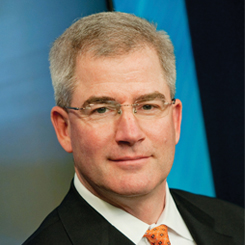Regulatory/Law
Tech Race
Like space exploration 50 years ago, technology advancements in the insurance industry today face enthusiasm as well as skepticism.
- Howard Mills
- October 2019
-





In the 2018 movie, First Man, astronaut Neil Armstrong (played by Ryan Gosling) says, “I don't know what space exploration will uncover, but I don't think it'll be exploration just for the sake of exploration. I think it'll be more the fact that it allows us to see things that maybe we should have seen a long time ago but just haven't been able to until now.”
July marked 50 years since the epic journey of Apollo 11. The Apollo astronauts (Buzz Aldrin and Mike Collins, in addition to Armstrong) could not find an insurer able to underwrite their lives at an affordable price while they pioneered space flight. They resorted to signing hundreds of U.S. postal service envelope covers that friends would have postmarked on the day of their launch so that their families could sell them in the event that they died on their missions.
Stunning advances in technology (not to mention political will, raw courage and many other factors) made the success of the U.S. space program possible. Today, we are entering into a technological revolution in the insurance industry that will have vast ramifications for everything from underwriting to claims settlement and every process in between, as it enables insurers to see risks and relationships they haven't been able to see until now.
Innovation and insurtech progress will not only re-engineer processes, it will change the basic construct of insurance models with new concepts such as peer-to-peer insurance, robo-advisory and usage-based insurance, and will do wonders for risk management.
Consumers will enjoy ease of access to insurance products, more options and underwriting tailored to their own unique risk profiles. Technological innovation in insurance models or illustrations will greatly increase transparency and comprehension and could, over time, contribute to an increase in take-up rates of life and annuity insurance products.
Technology could enable some long-awaited disruption in the industry and bring new entrants to the market. Established insurers are racing to embrace new technologies and to innovate so as to remain competitive, especially among the millennial generation where person-to-person interaction for basic insurance products is the exception and direct purchase through cellphones the norm.
The insurance industry's technological revolution will pose challenges and regulators are already pondering many aspects of the new landscape. The most fundamental concern I hear is whether artificial intelligence, machine learning and data analytics will enable insurers to underwrite at such a granular level so as to customize policies to such a degree that the very concept of insurance—risk pooling—will be undermined, and if this could lead to large groups of people or risks becoming uninsurable in the private insurance marketplace. Regulatory concerns about issues such as data privacy, discrimination, and cybersecurity will be never-ending. The use of algorithms using geographical data and other individual attributes also will be under constant scrutiny.
Insurers may rightly face skepticism from regulators similar to that expressed by Neil Armstrong's wife Janet (played by Claire Foy) in First Man. Upon being told things were under control, she says: “All these protocols and procedures to make it seem like you have it under control … but you're a bunch of boys making models out of balsa wood! You don't have anything under control!”
Insurers, like NASA, must convince regulators—who are in many ways stand-ins for a skeptical public—that they have the new technologies under control. If they can, and if they do, it is a safe bet that future astronauts—not to mention Earth-bound insureds—will have better insurance options than did Armstrong, Aldrin and Collins.

Best’s Review columnist Howard Mills is an independent senior adviser with Deloitte and a corporate director. He previously was superintendent of the New York State Insurance Department. He may be reached at howmills@deloitte.com.



























